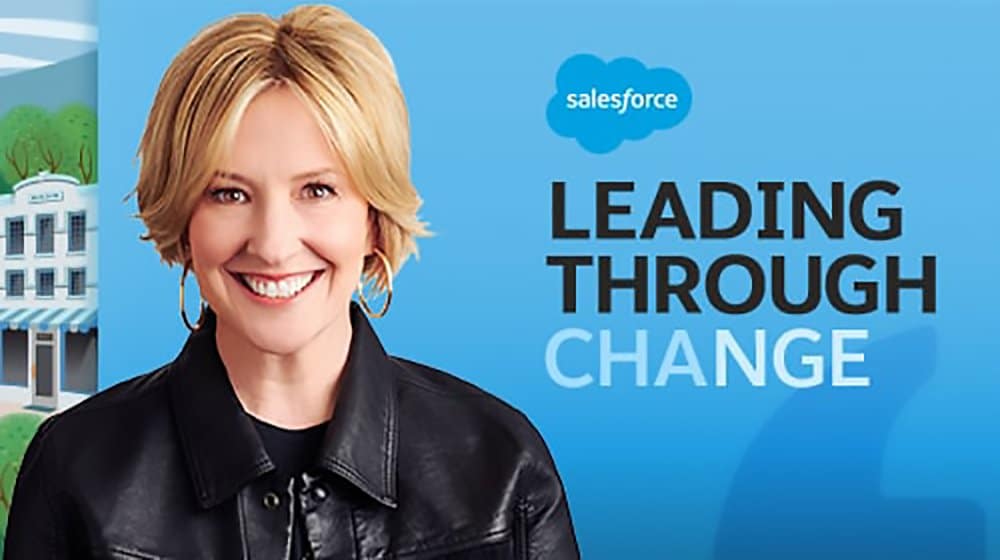
I’ve made exactly zero attempts to hide my love of Brené Brown, so when it came time to offer the small business community advice on resilient leadership, she was top of mind. Last week I had the good fortune to interview her along with a favorite Salesforce customer of mine, Eric Rodriguez from coliving platform Common.
The conversation proved both actionable and inspirational. Here’s a gorgeous visual recap from one listener — Melinda Walker at One Squiggly Line — and be sure to check out some of my favorite tips below.
Click image to view in a new browser window
1. We must prioritize communication
Like so many companies, coliving platform Common had to reimagine its business practices during this pandemic. Vice President of Operations Eric Rodriguez kicked off our discussion by sharing how the company changed operations early to benefit customers, while also committing to protect the health and safety of its employees.
Rodriguez stressed the need for both quick decisions and leadership transparency. His suggestions for customer communication were truly inspirational. Listen to a snippet of my interview with Eric below.
2. We have to be braver leaders
The pandemic has put everyone on alert. If you’re a leader and you’re not afraid right now, you’re not paying attention. How should small business leaders react? Brown put out a call: We have to have braver leaders and more courageous cultures. “It’s not fear that gets in the way of courageous leadership,” she said. “What gets in the way of courageous leadership is armor — what do we do when we’re afraid.”
When we’re afraid, even our neurobiology screams ARMOR UP. Everything screams, “Self protect!” As Brown says, if we want to be consciously daring, we need to say no armor. We have to double-down on being both transparent and vulnerable. If you’re feeling beat up right now, you’re in good company. The easy thing is to self-protect, but if you want to keep moving toward your mission, you’ve got to refuel.
3. Gratitude is especially important in a downturn
Brown’s research background came out when she explained how we sometimes find ourselves afraid to take our foot off the pedal because we’ll lose our sense of urgency. But data shows the opposite: gratitude actually helps you celebrate victories and avoid burnout.
Prioritizing gratitude can be a real challenge sometimes, like during global pandemics. But there’s tremendous relief in taking time each day to consider what you’re thankful for and letting others know how much you appreciate them. Thanks to Brown’s reminder, we now begin team meetings with moments of gratitude, and it’s been both uplifting and inspiring. But remember: As Brown says, “Gratitude is not an attitude or a choice; it’s a daily practice.”
4. Lead hard conversations with empathy
So many companies have to make tough decisions right now about workforce reductions, so one viewer asked for advice. Brown so beautifully reminded us to, “Make reductions in the most generous way and with the most dignity you can muster.” This approach has two benefits. First, of course, it’s the right approach for the people who lose their jobs. And second, you also create a safety net and infrastructure for the people who stay on.
As leaders, it’s important to lead with empathy and have support in place for your employees who’ve lost their colleagues, friends, and partners. Allow them the space to feel grief. We’ve been conditioned to think the ones who keep their jobs will be overwhelmed with gratitude, but that’s not the case. The ones who remain see tremendous leaps in anxiety and fear, too.
5. Supporting mental health requires a culture of courage
One viewer asked about mental health and how leaders should provide access to additional support. Brown responded by saying not only should companies have the structure and resources in place for employees to get help, but they also need a culture in place that supports asking for help.
Unfortunately, when people find the courage to vocalize their mental struggles, it’s often met with resistance. We have to normalize mental health issues and prioritize wellness. This goes back to building courage and vulnerability. We have to encourage and support the necessary tough conversations.
6. “There is no courage without vulnerability”
That line is vintage Brown: “To lead is to be vulnerable every minute of every day; there is no courage without vulnerability.” Here Brown suggests organizations operationalize their company values — take each value and translate it into three visible behaviors. This exercise helps you consider what kind of leader and human you want to be right now.
There’s no playbook for this pandemic. Leaders have to learn things and make decisions on the fly. It’s important to be honest and transparent. Instead of making empty promises, say (and mean) things like, “Here’s what you can count on me for” and “I don’t have all the answers right now, but I can promise to stay in touch.”
Salesforce helps you find more customers, win their business, and keep them happy so you can succeed. Learn more about our small business CRM solutions by following us on Twitter, LinkedIn, and Instagram.
For more business and leadership inspiration, check out our entire Leading Through Change series.
Republished by permission. Original here.
Photo via Salesforce
This article, “Vulnerability Expert Brené Brown Explains How to Be a Braver Leader” was first published on Small Business Trends